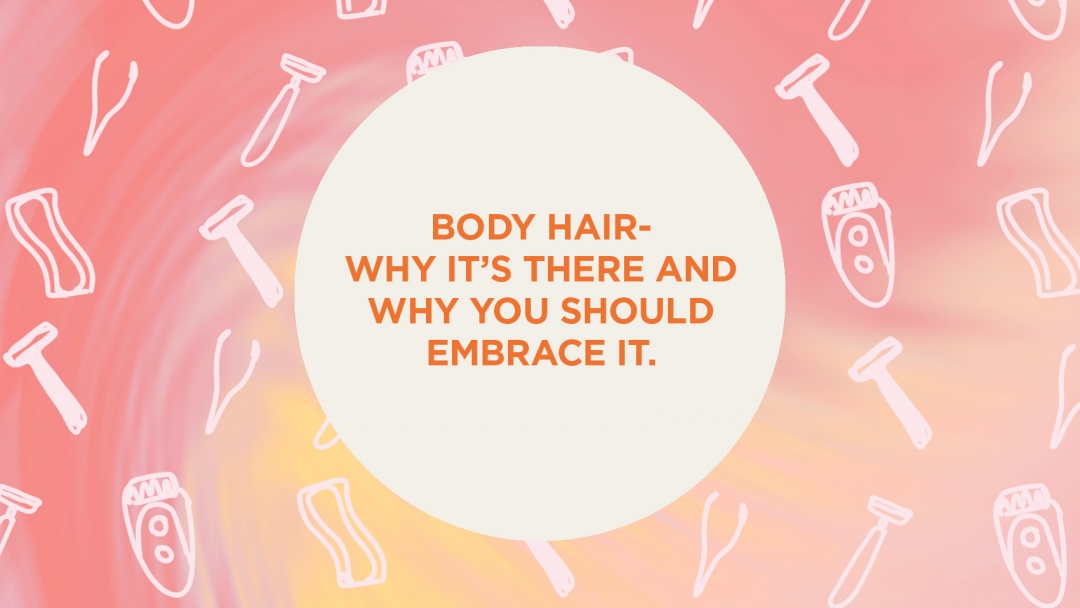It’s no secret that personal grooming can be a hairy subject – especially when it comes to body hair. Whenever they see an unshaven leg above a stiletto or a hairy armpit peeking out from a sundress, people are ready to share their opinions at a moment’s notice, sometimes quite passionately. Why is the pressure to shave so high for some people but not for others?
Let’s look at the woolly theories on why we have body hair, why it can be such a bristly subject, and why you should embrace it – regardless of whether you keep it or not.
Shaving myths
Hair removal has been around for a long time – since the Stone Age at least. Without starting a history lecture, the ever-evolving practice of removing hair has been used to communicate youthfulness and cleanliness in some cultures, while in others body hair is seen as a sign of maturity.
You’ve seen the ads with tanned, sleek, shiny-skinned models striding confidently across a beach, desert or bathroom, razor in hand as their long legs glisten under dozens of studio lights. We’re not here to tell you it doesn’t look good, but do these ads contribute to the view of body hair as dirty and unfeminine?
It’s normal to struggle with body hair, especially during puberty. Natasha, 22, remembers feeling the pressure pile on at school: “Whenever I started getting armpit hair, that’s what I felt the most pressure to remove.“
Marie, 48, says, “I don’t shave my armpits anymore because my daughter just started getting armpit hair and I don’t want her to think she has to do it.” Puberty blues aren’t the only reason to keep your hair on.
Erica, 30, says, “My skin reacts badly to shaving and I hate waxing. I don’t see the point of doing something I hate so that other people can be comfortable with my armpits and ankles.”
Common Misconceptions
So how much body hair is normal for a woman, exactly? Despite the fine, fuzzy hair covering our bodies (known as vellus hair), we are already naturally a pretty hairless breed of mammal. Most other mammals are covered in hair, from our close relatives the chimpanzee to the (thankfully not quite as close) platypus.
Our ancestors had a lot more of that thick, luscious body hair than we do today. We’re not 100% sure why, but there are theories. Maybe we used to spend more time in the water, maybe our ancestors were super active, or maybe it was selective mating. It might have been to help us stay cooler in the sun. Maybe it was a little bit of everything!
Hairless armpits, legs, arms, bellies, vulvas, feet, hands, and nipples might sometimes be treated as the norm, but the only parts of your body that cannot grow hair are the palms of your hands, the soles of your feet, and your lips. The absence of hair on palms and soles is thought to be an evolutionary trait to make it easier to grip things, and the reason you don’t have hairy lips is that the skin is different, being where your digestive system meets the rest of your skin (they also don’t sweat!). Barring the presence of a rare genetic disorder, those are the places where there are no hair follicles. Even people with uteruses sometimes have chest hair, and that’s normal.
Is body hair a sign of high testosterone?
Testosterone can cause hair growth but it’s not always a sign of high testosterone levels. Testosterone and oestrogen are sex hormones, and they help determine how your hair grows. This means not only where, but also the texture, thickness and colour of that hair. People who suffer from polycystic ovary syndrome might experience excess body hair but also thinning of the hair on their heads due to a higher level of testosterone.
You might be wondering now, does oestrogen reduce body hair? Not necessarily. While some forms of hormone replacement therapy (HRT) is used to treat excessive body hair growth, there is no guarantee that it will reverse excess body hair growth.
Does body hair cause odour?
Some people think that body hair makes you sweat more, causing body odour. But does body hair make you sweat more? Probably not. Washing – particularly around the sweat glands and pubic area – and making sure to remove dead skin along with using deodorant. These are much more effective ways of handling odours than shaving alone because it’s the sweat that smells, not the hair. Hair removal and maintenance can be a huge, time-consuming project.
You could always spend that time working on your novel, going bouldering, dismantling the system that occasionally makes you feel like you should try a Brazilian wax – or doing literally anything else you fancy spending your time on. You can also shave your pubic hair, wax your legs or dye your armpit hair bright blue. Embracing body hair can be hard, but self-care and self-expression are important. At the end of the day, it’s your body and your personal preference that matters.
If you’re feeling a little low on self-esteem right now, why not check out these 8 Instagram accounts to give you a confidence boost?
Hana film-coated tablets. Oral Contraception. Contains desogestrel. Read label.


